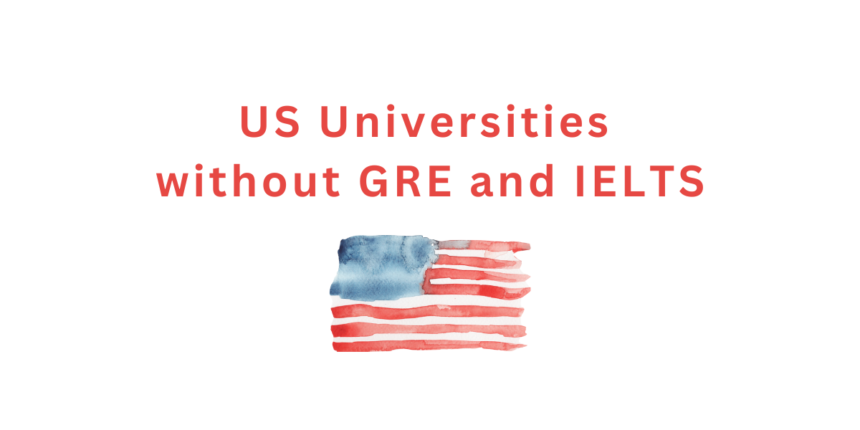In recent times, many colleges around the world are changing how they admit students, and this is affecting higher education. Some American universities are becoming more open-minded. The U.S. is known for tough entry tests like the GRE and language exams like the IELTS. But now, there’s a shift to attract talented individuals from all over the world. In this article, we’ll talk about US Universities without GRE and IELTS, so it’s useful for people thinking about studying in US.
Check this – STScI SASP Summer Program 2026 in USA
US Universities without GRE and IELTS
In the past, entering graduate programs in the US required taking exams like the GRE and IELTS. These tests were seen as crucial for the application process. However, some colleges are now questioning how useful these tests really are in predicting academic success. They’ve noticed the limitations and biases linked to these exams.
As a response, several universities have introduced a test-optional policy. This means applicants can apply without submitting their IELTS or GRE scores. This change acknowledges that factors like a candidate’s work experience, academic record, and other qualitative aspects can offer a better understanding of their abilities. This is particularly beneficial for international students who might excel in their fields but face challenges in language proficiency or standardized testing.
Did you check – Scholarships in US | Study in US |Scholarships for international student’s
List of US Universities without GRE and IELTS
Universities Without GRE Requirements:
#1 Massachusetts Institute of Technology (MIT)
You don’t need to take the GRE test anymore to apply for the Master of City Planning degree at MIT’s Department of Urban Studies and Planning. This change shows that they believe success in planning doesn’t just depend on doing well in standardized tests.
#2 University of California, Berkeley (UC Berkeley)
The Master of Information and Data Science (MIDS) program at UC Berkeley’s School of Information doesn’t ask for GRE scores anymore. This decision demonstrates a commitment to evaluating applicants based on their overall academic and professional accomplishments, not just their performance on standardized tests.
You don’t need to take the GRE for the University of Arizona’s MBA program at Eller College of Management. Instead, they want applicants to focus on sharing their accomplishments, goals, and work experiences.
The University of Chicago School of Social Service Administration no longer requires tests for its Master of Arts in Social Work (AM) degree. This decision emphasizes the importance of looking at the whole picture when admitting students, considering their experiences, background, and personal qualities.
The Computer Science Master of Science program at Purdue University’s Department of Computer Science no longer requires the GRE. Instead, the department focuses on evaluating candidates based on their academic performance, letters of recommendation, and relevant work experience.
Universities Without IELTS Requirements:
International applicants to the University of Dayton’s undergraduate and graduate programs no longer need to take the IELTS test. The university now considers other English proficiency tests like the Duolingo English Test or the TOEFL.
Besides making the Master of Arts in Social Work degree test-optional, the University of Chicago has also waived the IELTS requirement for international applicants. This decision aims to foster a diverse and inclusive student body while removing barriers for those who are not native English speakers.
If international students don’t meet the IELTS requirement, they can join the English Language Institute (ELI) programs at the University of Delaware. Completing the ELI program is another way for non-native English speakers to show they’re good at English.
Drexel University’s College of Engineering doesn’t require overseas applicants to submit IELTS scores for their graduate programs. The college considers the applicant’s work and academic background, along with other ways of assessing English proficiency.
International applicants to the University of Houston might not need to take the IELTS test if they meet specific criteria, like achieving a certain TOEFL score or completing a degree program in an English-speaking country.
Test-optional policies offer several benefits to both students and educational institutions. Here are some key advantages:
- Diversity and Inclusion: Test-optional policies can enhance diversity by providing opportunities for students from various backgrounds, experiences, and educational systems. This approach acknowledges that standardized tests may not accurately reflect the potential or abilities of all students.
- Reducing Test-Related Stress: Eliminating the requirement for standardized tests can alleviate stress for students during the application process. This is particularly beneficial for individuals who may not perform well under test conditions but possess other valuable skills and qualities.
- Holistic Admissions: Test-optional policies encourage a more comprehensive evaluation of applicants. Admissions committees can focus on a candidate’s overall academic achievements, extracurricular activities, personal qualities, and experiences, providing a more nuanced and fair assessment.
- Access and Equity: Test-optional policies contribute to greater equity in education by removing potential barriers for students who may not have access to test preparation resources or face socio-economic challenges. This promotes a fairer and more accessible admissions process.
- Enhanced Predictive Validity: Some studies suggest that standardized tests may not be the most accurate predictors of academic success. By adopting test-optional policies, institutions have the opportunity to explore alternative methods for assessing a student’s potential for success in higher education.
- Adaptation to Educational Changes: Test-optional policies allow institutions to adapt to evolving educational landscapes and pedagogical approaches. Relying solely on standardized tests may not align with the diverse ways students learn and demonstrate their capabilities.
- Positive Institutional Image: Universities that adopt test-optional policies may be perceived as progressive and student-focused. This can enhance the institution’s image and appeal to a broader range of prospective students.
In conclusion, test-optional policies contribute to a more inclusive, fair, and student-centered approach to admissions, aligning with the evolving understanding of diverse educational pathways and individual strengths.







